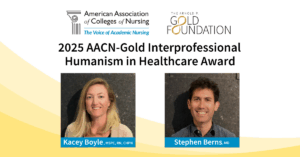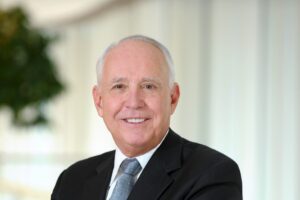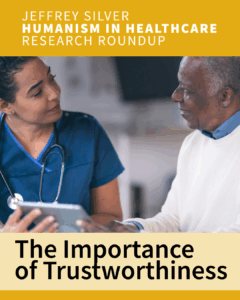by Hedy S. Wald, PhD

Wish you were here, my postcard would read to all the handwringers out there.
To all those convinced without a shadow of a doubt that the sky is falling, the sky is falling, at least in terms of physician caring and compassion and empathy:
To all those alarmists fueling angst with the lingo of physician and other health care professionals’ burnout as extinguishing the fires of passion for making a difference in people’s lives:
To all those who’ve thrown in the towel on the power of that Hippocratic oath to instill core values of care and caring for a lifetime of service:
I ask you to read on and get inspired and feeling good about what’s good in the world of health care.
I’m just back from the Whole Person Care conference where I went with a group of third year medical students from Alpert School Medical School at Brown University to present “Bringing Our Whole Person to Whole Person Care.” (ref 1)
The concept of Whole Person Care has been pioneered and carried forth by Drs. Balfour Mount, Michael Kearney and Thomas Hutchinson. Whole Person Care is “based on the premise that in situations in which treatment is unable to change the disease outcome, it may be possible to create a space in which healing can occur.” For mindful medical practice that integrates processes of curing and healing, it takes “being with” a patient along with the “doing.”
The McGill Program in Whole Person Care (WPC), founded in 1999, “seeks to integrate the physical aspects of personhood along with the psychosocial and existential/spiritual ones, and to better understand how to respond to suffering experienced by the whole person.” Consider how spot-on such an approach is for the challenges of palliative care – these physician-scientists did. Its relevance for humanistic health care in general is now being increasingly recognized.
The session my students and I presented at the conference grew out of the thinking I’d been doing — How can healthcare professionals best bring their “whole person” to this paradigm of whole person care? Within a standardized medical education, how can we as medical educators provide a personalized approach as well, capturing and honoring our students’ strengths, qualities, personal identities, values, aspirations? The challenges of integrating professional values within one’s personal identity as well as the triumphs?
I oversee the reflective writing curriculum in our Family Medicine clerkship. I started noticing the power of reflective narratives for enhancing medical students’ ability to create meaning from their clinical experiences. And the value of fostering reflection to support the active construction of their professional identity, beginning in year one and developing through year four and beyond into residency years.
I started studying it with a research team at Brown and started writing about it (Reflecting on reflections, Supporting medical students’ rites of passage). Wanted to shout it from the rooftops. But there was no need to – the narratives spoke for themselves. The proof in the pudding. The grappling with breaking bad news, the striving for quality, for getting it right, the effort to sustain emotional steadiness within patients’ stories that tear your heart apart, bringing compassionate presence to an ill patient, trying to reconcile idealized visions with reality hitting and not losing the essence of why they went into this profession at all…
For those of us in the “fellowship of the pen,” writing provides a structured form in order to inform…It serves as a trigger to deeper reflection on our own lived experiences as health care providers, those of our patients and their families, and the joined efforts. “How can I know what I think until I see what I write?” Scotty Preston of the NYTimes pondered.
And so, we ask students to write about patient care experiences. And as responsible educators, we become skilled readers to guide health care professions students to notice and be present, recognize dilemma, develop emotional awareness, consider multiple perspectives, challenge assumptions and create meaning in the written word. To develop compassionate “self, other and situational (SOS)” awareness in order to be able to provide whole person care, the “SOS” to “rescue” us.
Interest is growing in faculty development for guiding reflection with quality, individualized written feedback to students’ narratives – I’ve been providing interprofessional workshops internationally on using reflective writing interactively (with faculty and facilitated collaborative peer feedback) to foster reflective capacity in health professions education and practice, hearing patients’ stories and our own (ref 2).
Some of our students began articulating how these reflective writing exercises were making a difference, how the writing helped facilitate emotional education, nurture awareness, and foster examination and integration of experiences, even more challenging ones. How uncomfortable feelings of uncertainty and frustration with not always being able to “fix” or inspire a patient to adopt healthy lifestyle behaviors are part of the norm in doctoring. Helping them to identify their own cognitive, emotional, moral, and spiritual qualities they bring to the therapeutic physician-patient relationship and how this might be making a difference in compassionate, competent health care. How to engage in suffering and not be consumed by it. How to be present.
Reflection helps support the shaping of a physician, developing the “habits of mind, heart, and practice” that Dr. Lee Shulman of the Carnegie Foundation described in relation to professional formation. And reflective writing helps to foster the reflection for all of this and more.
Reporting from the Whole Person Care conference in Montreal, I’m here to let you know these medical students, your future doctors, are awesome. Their heads and hearts are in the right place and they will find a way through the rapidly shifting tides of health care to bring their whole person to whole person care and preserve humanism in medicine.
Wish you were here.
References
- Armstrong GA, Kofman A, Sharpless JJ, Anthony D, Wald HS. “Bringing Our Whole Person to Whole Person Care”: Fostering Reflective Capacity with Interactive Reflective Writing in Health Professions Education. First International Congress on Whole Person Care, Montreal, Canada, October, 2013. Conference sponsor: Arnold P. Gold Foundation
- Wald, HS. Fostering Reflective Capacity Using Interactive Reflective Writing in Health Professions Education and Practice – Visiting Scholar, Faculty Development Workshop. http://www.slp.utoronto.ca/why-u-of-t/4623/ http://www.edu.uwo.ca/inspire/wald_talk.html http://louisville.edu/palliativecare/palliative-care-education.html
 This post was written by Hedy S. Wald, PhD. Dr. Wald is Clinical Associate Professor of Family Medicine at the Alpert Medical School of Brown University, a Fulbright Scholar and a Gold Humanism Scholar at the Harvard Macy Institute. Her writing has appeared in Academic Medicine, Lancet, JAMA, Chest, Ars Medica, Journal of General Internal Medicine, Literature and Medicine, Newsweek, and other publications and she has co-authored a chapter entitled Medicine in the Third Reich – A New Medical Education Agenda in the book Medical Education: Global Perspectives, Challenges, and Future Directions (Giardino AP, Giardino ER, eds, 2013). Her co-authored chapters on fostering reflection to enhance interprofessional education and on the use of abstract art and narrative to promote reflective capacity in health professional education will appear in the forthcoming book Keeping Reflection Fresh (Peterkin A, Brett-MacLean P, eds, 2014).
This post was written by Hedy S. Wald, PhD. Dr. Wald is Clinical Associate Professor of Family Medicine at the Alpert Medical School of Brown University, a Fulbright Scholar and a Gold Humanism Scholar at the Harvard Macy Institute. Her writing has appeared in Academic Medicine, Lancet, JAMA, Chest, Ars Medica, Journal of General Internal Medicine, Literature and Medicine, Newsweek, and other publications and she has co-authored a chapter entitled Medicine in the Third Reich – A New Medical Education Agenda in the book Medical Education: Global Perspectives, Challenges, and Future Directions (Giardino AP, Giardino ER, eds, 2013). Her co-authored chapters on fostering reflection to enhance interprofessional education and on the use of abstract art and narrative to promote reflective capacity in health professional education will appear in the forthcoming book Keeping Reflection Fresh (Peterkin A, Brett-MacLean P, eds, 2014).


